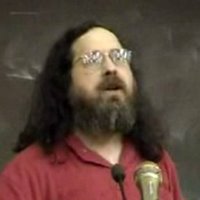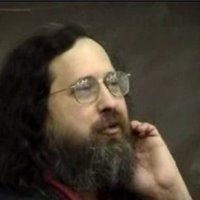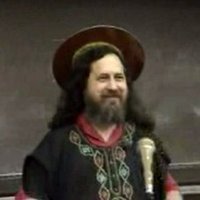Richard Matthew Stallman, the father of the GNU movement once gave a talk at the Australian National University where he explained his stand on the name GNU/Linux, the Digital Millennium Act, DRM which Stallman chooses to call Digital Restriction Management and software idea patents. He talked for over one hour explaining and throwing light on these and many other topics of interest to GNU and all freedom loving people.
RMS on why people should call it GNU/Linux instead of just Linux
 ... So the goal we had set out to reach in 1984 had been reached (with the development of the Linux kernel). But at the same time, a confusion developed, we started thinking that the entire operating system was Linux. And this confusion was a serious blow to the free software movement. Because, before that time, the people who saw various pieces of GNU knew that they were doing so and they became GNU fans. And so when they came across the articles written about the philosophy of GNU, they wouldn't guarantee to agree with us but at least they would pay serious attention and say we are fans of GNU and this is the philosophy of GNU.
... So the goal we had set out to reach in 1984 had been reached (with the development of the Linux kernel). But at the same time, a confusion developed, we started thinking that the entire operating system was Linux. And this confusion was a serious blow to the free software movement. Because, before that time, the people who saw various pieces of GNU knew that they were doing so and they became GNU fans. And so when they came across the articles written about the philosophy of GNU, they wouldn't guarantee to agree with us but at least they would pay serious attention and say we are fans of GNU and this is the philosophy of GNU.After there was a complete GNU system with Linux that you could get to run, people started thinking that it was Linux. But before that point, our software spread the philosophy and our philosophy help spread the software because when the people read this, if they agree, they will be motivated to develop more free software and add to GNU.
However after people started using essentially the GNU system with Linux added, and called it Linux, it no longer led then to the philosophy associated with GNU - the philosophy of free software. Instead of that, the people read the philosophy that was associated with the name Linux. The apolitical philosophy of Linus Torvalds who thinks that all software licences are legitimate and it is wrong ever to violate them. So his views on this are more or less the same as Microsoft's. Now he of course has the right to promote his views but I object to our work becoming the main basis for promoting his views because it is attributed to him directly by labeling the GNU system as Linux. And that is why I ask people to call the system as GNU/Linux.
Give us equal mention. We need it. We need it not just because it is fair but because it will help people recognize what we have done so they will think about what we are asking them help us do. Our work is not finished. People will sometimes give me advice which in other circumstances might have been wise. They would say, it looks bad to ask for credit. And so they say, when the people call the system Linux, smile to yourself and take pride in a job well done. This would be very wise advice if it were true that the job is done. We made a great beginning. We have developed more than one free operating system in our community and many free application programs. But there are many application programs we still have to develop. We have developed free operating systems used by 10's of millions of users. But there are 100's of millions of users of proprietary operating systems and even the people using free operating systems often use proprietary programs on top of that. So we have a tremendous amount of work to do.
RMS on Digital Millennium Copyright Act and DRM
 ...
...Today the main question is whether we would be allowed to develop the software that the users want. In the US, there are already two laws forbidding the development of various kinds of free software. One of these laws is the Digital Millennium Copyright Act - The law that forbids free software to access encrypted or some how blocked off data. This law was used to prohibit the free software from playing a DVD. If you buy a DVD in the US, it is legal for you to watch the movie. But the free software that would enable you to do this on your free GNU/Linux system has been censored completely. There is in fact no lawfully available software in the US that you could use to watch a DVD.
But I am afraid, they have carried this even further. There is a certain computer game that is accompanied by a network server that allows people to play against each other and they communicate with some kind of cryptic protocol. And people figured this out and implemented their own server and they have their own free game which is some what similar. They wrote it themselves and is not a modified work within modified proprietary game that won't have been illegal anyway. So they wrote their own game and they have their own server. And you could use either game and talk to either server. And they were sued. A court ruled that these free alternatives are illegal ones under the digital millennium copyright act. Now please note that using either one of these free alternatives doesn't enable one to use the proprietary one without paying. We have here two separate products being tied together through the use of this law.
The Digital Millennium Copyright Act is used to impose DRM (Digital Restriction Management) on the public. So they are not satisfied with prohibiting people from sharing with their neighbours. They want to redesign your computer system to stop you from sharing and this is wrong. DRM is fundamentally wrong in itself because it stops people from cooperating with their neighbours. And a government of the people, by the people and for the people will not enact laws that support DRM in any way. So that is one law which prohibits certain kinds of free software.
RMS on Software Idea Patents
 Another law in the US which prohibits free software from any progress of any kind is the patent law. In the US, any kind of software idea for use in any kind of software can be patented by some one. Which means that when you implement that idea, you could get sued. Now large programs combine many ideas. A program can combine easily 100's or 1000's of different ideas. And if any one of these ideas is patented, your chances of developing a large program without infringing many patents is absurdly small. So software patents are obstacles to all software development. And they threaten users as well. The users can also get sued for the software they are using, for the way they have configured their machines and so on.
Another law in the US which prohibits free software from any progress of any kind is the patent law. In the US, any kind of software idea for use in any kind of software can be patented by some one. Which means that when you implement that idea, you could get sued. Now large programs combine many ideas. A program can combine easily 100's or 1000's of different ideas. And if any one of these ideas is patented, your chances of developing a large program without infringing many patents is absurdly small. So software patents are obstacles to all software development. And they threaten users as well. The users can also get sued for the software they are using, for the way they have configured their machines and so on.And this is advertised as a scheme to promote progress. But economic research shows just the opposite. Now I used to ask people to imagine how many different patents one program could be implemented by at once. I would say dozens, may be 50. Well now we do not have to imagine. Somebody did a study, must have been a lot of work. He took one particular program named Linux - the kernel of the GNU/Linux system. And he checked for all the US patents that covers something that could be found somewhere in Linux. He found 286 different US patents that covers parts of Linux. And Linux is just one part of the system. I saw an estimate somewhere else that it was 25 % of the system.
So if we note, we can get a rough estimate of around a 100,000 or so different software idea patents in the US that would cover ideas used some where in GNU/Linux system of today. Of course, it is a rough estimate and it wouldn't surprise me if it were only 30,000 or as much as 300,000. So now you see the danger. And since this danger is not only for free software developers but for all software developers aside perhaps from the mega corporations, there is actually a very broad movement against the software idea patents. This movement which I am led to say I played a major role in starting about 40 years ago has actually persuaded the European Parliament which voted to reject software idea patents. Now European Union is set out to have only a little democracy in it. ... The process is not over yet and we are still fighting it but there is a good chance that we can win at the level of the European Union. Of course Microsoft wants software idea patents. Microsoft has stated that it intends to use software idea patents to kill off GNU/Linux.
RMS on developing a free Java platform and on Flash and MS Word file formats
 One of the big dangers in our community is that people start putting non-free software into the system and they call it bonus. They say it is a nice addition, it gives more features. Yes it gives you more features at the cost of your freedom. When these things are distributed separately, they call it value added packages. And that term makes it stick about your values. It says it values your convenience only, don't value your freedom. So I prefer to call them freedom subtracted packages. That makes a statement about my values.
One of the big dangers in our community is that people start putting non-free software into the system and they call it bonus. They say it is a nice addition, it gives more features. Yes it gives you more features at the cost of your freedom. When these things are distributed separately, they call it value added packages. And that term makes it stick about your values. It says it values your convenience only, don't value your freedom. So I prefer to call them freedom subtracted packages. That makes a statement about my values.But they also include them, incorporate them in various distributions of GNU/Linux system. For instance, Sun has a version of the GNU/Linux system which they call the Java Desktop. Now they are not giving credit either to Linux or GNU but that is not an important issue when we look at what they are doing which is really bad that is, including several non-free programs including Sun's Java platform. Sun's Java platform is not free software. You shouldn't install. If you do install it, you are putting yourself at risk of creating other problems for other people. There are people who are so attracted to java - they think this idea that will run on all platforms is so exciting - that they stop paying attention to things like what to pay attention to. They will write programs in java, they will write free programs in java and offer to people and it turns out it doesn't run on all platforms, it doesn't run on a free platform.
You see, we have free java platforms. But they don't implement all features yet. Sun keeps on adding features and our efforts are speeding up but they are still behind. So many of the java libraries or the newer language features, we don't have yet. So if you use them in your free program, it would run on a free platform and you will find that your program is actually an inducement to people to install non-free software. The same thing is happening when websites use java or websites use flash.
The use of flash websites is a major problem for our community. People are working in free software for playing flash. And now it more or less handles just the display of things but it doesn't handle reading input. If you see a website using flash, complain. Complain to the site developer saying you are excluding people who believe in maintaining their freedom. Please get rid of the flash from your site.
A similar problem occurs when people distribute files in word format. And peoples approach to this used to be find some way to arrange to read it. And I pointed out that this is actually not a right response in the long run. You see, people worked on figuring out the details of the secret of word format. And figured out a lot of them. So there is free software today like openoffice that can read word files. But it is still short term thinking just to address this problem as right because Microsoft can keep changing the word format. And every time they make word files in this new format and they send to other people and other people can't read them. And so they feel like have to upgrade word as well and the result is a large number of these windows users are using new version of word and they send us these word files in a different format which our software can't read. And maybe it is patented and we will get sued if we make our free software read.
To solve this office problem, we have to remove Microsoft's control over the language that people use to communicate with each other and with themselves - like saving your files so you could read your files later. We have to refuse to use word format for this. When people send you a word file, therefore don't cope with the situation by reading it. Instead it is much better to send back a message saying - please don't ever send me word files. This is contributing to a serious social problem. But send it in public documented formats which everyone is free to implement so you are not giving a particular company any power it shouldn't have.
Fundamentally, the use of non-free software program gives somebody power of the kind that nobody should have. And therefore software should be free. Computer users should always have the freedom to control their computers. And they should be free to cooperate with each other in doing so.
RMS on Free software Vs Opensource
 ... In 1998, some of them started another way of talking about free software where they call it opensource. And with this different name, they have associated a different set of ideas. They don't say that this is a matter of the freedom that every user should have. In fact, they would often say that they recommend a development methodology which they say will generally produce more powerful and reliable software. And that may be true. I hope it is true. It would be nice if freedom provides as a byproduct, security of software. But it is a terrible mistake, I think, to focus all the attention on these short term practical benefits and ignore freedom itself. The danger is, then people would fail to defend their freedom when it is threatened as they wouldn't recognize what it is.
... In 1998, some of them started another way of talking about free software where they call it opensource. And with this different name, they have associated a different set of ideas. They don't say that this is a matter of the freedom that every user should have. In fact, they would often say that they recommend a development methodology which they say will generally produce more powerful and reliable software. And that may be true. I hope it is true. It would be nice if freedom provides as a byproduct, security of software. But it is a terrible mistake, I think, to focus all the attention on these short term practical benefits and ignore freedom itself. The danger is, then people would fail to defend their freedom when it is threatened as they wouldn't recognize what it is.So if you imagine two people, one who is convinced by the opensource philosophy and another who is convinced by the free software philosophy. And you show these people a powerful, reliable, convenient, non-free program. What are they going to say ?
The opensource guy would say - "I am surprised you were able to do such a good job without letting the users study the code and find the bugs for you. But I can argue with the facts. It seems a powerful and reliable program". And he will probably use it. Where as the free software person will say - "I don't care how powerful and convenient it is if it takes away my freedom. I wouldn't pay such a high price for that convenience. I am going to get to work on a free replacement for this program right away before anybody else get tempted to use that program".
One person would give up his freedom when ever you can offer him convenience in its return and the other would fight for his freedom. And if enough of you fight for your freedom, freedom may prevail.
RMS on RMS
 Now people sometimes have accused me of having a holier than thou attitude. I think that is not actually true. I don't criticise and condemn people just because they don't stand up for free software strongly as I do. As long as what they are doing is good, I will say what they are doing is good and I might suggest somethings they could do.
Now people sometimes have accused me of having a holier than thou attitude. I think that is not actually true. I don't criticise and condemn people just because they don't stand up for free software strongly as I do. As long as what they are doing is good, I will say what they are doing is good and I might suggest somethings they could do.However, I do have a holy attitude because I am a saint. It is my job to be holy. I am saint iGNUcius of the church of Emacs. I bless your computer my child. Emacs started out as a text editor which became a way of life for many users because it could do almost everything without exiting Emacs. And ultimately a religion. We even have a great schism between two rival versions of Emacs. And now we have a saint too. Fortunately no gods. In this church, instead of gods, we have an editor.
To be a member of the church of Emacs, you must recite the confession of the faith. You must say, there is no system but GNU and Linux is one of its kernels. The church of Emacs has certain advantages compared with some other churches. To become a saint in the church of Emacs does not require celibacy. However, it does require living a life of moral purity. You must exorcise the evil proprietary operating systems that posses what ever of the computers under your control and install in all of them a holy free operating system instead. And then, only install free software on top of that. If you make this commitment to live by it, then you too would be a saint and you may eventually have a halo if you can find one because they don't make them any more.
Sometimes, people ask me if it is a sin in the church of Emacs to use the editor Vi. It is true that Vi-Vi-Vi is the editor of the beast. But using a free version of Vi is not a sin but a penance. And sometimes, people ask me if my halo is really an old computer disc. This is not a computer disc. It is my halo. But it was a computer disc in a previous existence.
This talk was originally video taped by ourTV - a community TV channel in Canberra but unfortunately, they were unable to get their project off the ground because of lack of funds. You can watch the whole video here (240 MB download).
This talk was originally video taped by ourTV - a community TV channel in Canberra but unfortunately, they were unable to get their project off the ground because of lack of funds. You can watch the whole video here (240 MB download).
Suggested Reads:
No comments:
Post a Comment